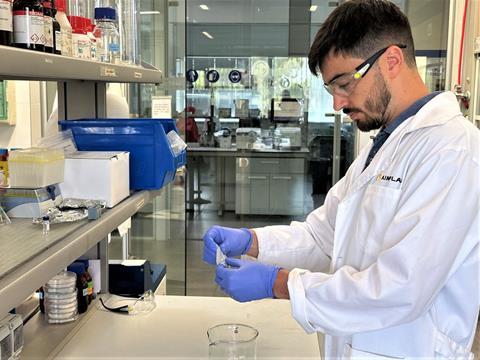
AIMPLAS, the Plastics Technology Centre, has apparently converted synthetic plastics into biodegradable bioplastics through methods based on microwaves and reactive extrusion as part of the BioICEP Project; the results are set for use in the packaging and pharma industries.
This involves the application of microwave-assisted thermochemical degradation, which reportedly turns fossil-based plastic waste into natural, biodegradable alternatives and accelerates the biodegradation of conventional plastics. These are said to completely degrade in less than 28 days.
AIMPLAS explains that the depolymerisation of polyamides is another technology used to return polymers to their original monomers, which can then be degraded by microorganisms and turned into bioplastics and other products of interest. Reactive extrusion technologies have also been used to alter the structures of polymeric chains and improve their biodegradability.
The work forms part of AIMPLAS’ involvement in the Bio Innovation of a Circular Economy for Plastics or BioICEP project. Founded in February 2020, the project is funded by the Horizon 2020 programme and aims to develop environmentally friendly and sustainable replacements for petroleum-based plastics.
Within the project, AIMPLAS is the coordinator in charge of communication activities and the dissemination and exploitation of results.
BioICEP’s suggested solution to reducing plastic waste in the environment is a three-step consecutive process. This involves chemical disintegration processes, including a new microwave-based technology that reduces the molecular weight of base polymers to improve biodegradation; biocatalytic digestion with improved enzymes, using techniques such as screening with fluorescent sensors and directed evolution; and microbial consortia developed from best-in-class single microbial strains used in combination to degrade mixed plastic waste streams.
The end products are set to be used in the production of new polymers and bioproducts, theoretically ushering in a circular economy for plastic waste.
AIMPLAS is also a member of the European BeonNAT project, which recently announced that it had cultivated biomass from such organic materials as poplar, elm, and birch wood to produce bioplastics for bioactive cosmetics, biochar, activated carbon, and pet litter with essential oils.
Additionally, the EU-funded Bio-Uptake project, co-ordinated by Aitiip Centro Tecnológico, has sought to produce bio-based intermediates for the manufacture of eco-container lids – thus hoping to integrate bioplastic composites into the European manufacturing industry and drive digitalisation.
If you liked this article, you might also enjoy:
The Lidl approach to packaging sustainability
How did Brazil achieve its 100% aluminium can recycling rate – and can it be replicated in the EU?
Experts have their say on the EU’s Packaging and Packaging Waste Directive revisions
A deep dive into the most important packaging sustainability trends and solution














No comments yet